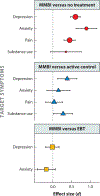Mindfulness Meditation and Psychopathology
- PMID: 30525995
- PMCID: PMC6597263
- DOI: 10.1146/annurev-clinpsy-021815-093423
Mindfulness Meditation and Psychopathology
Abstract
Mindfulness meditation is increasingly incorporated into mental health interventions, and theoretical concepts associated with it have influenced basic research on psychopathology. Here, we review the current understanding of mindfulness meditation through the lens of clinical neuroscience, outlining the core capacities targeted by mindfulness meditation and mapping them onto cognitive and affective constructs of the Research Domain Criteria matrix proposed by the National Institute of Mental Health. We review efficacious applications of mindfulness meditation to specific domains of psychopathology including depression, anxiety, chronic pain, and substance abuse, as well as emerging efforts related to attention disorders, traumatic stress, dysregulated eating, and serious mental illness. Priorities for future research include pinpointing mechanisms, refining methodology, and improving implementation. Mindfulness meditation is a promising basis for interventions, with particular potential relevance to psychiatric comorbidity. The successes and challenges of mindfulness meditation research are instructive for broader interactions between contemplative traditions and clinical psychological science.
Keywords: RDoC; meditation; mindfulness; neuroscience; psychopathology.
Conflict of interest statement
DISCLOSURES
R.J.D. is the founder and president, and serves on the board of directors, of the nonprofit organization Healthy Minds Innovations, Inc. The other authors are not aware of any affiliations, memberships, funding, or financial holdings that might be perceived as affecting the objectivity of this review.
Figures

References
-
- Alberts HJ, Thewissen R, Raes L. 2012. Dealing with problematic eating behaviour: the effects of a mindfulness-based intervention on eating behaviour, food cravings, dichotomous thinking and body image concern. Appetite 58(3):847–51 - PubMed
-
-
Alsubaie M, Abbott R, Dunn B, Dickens C, Keil TF, et al. 2017. Mechanisms of action in mindfulness-based cognitive therapy (MBCT) and mindfulness-based stress reduction (MBSR) in people with physical and/or psychological conditions: a systematic review. Clin. Psychol. Rev 55:74–91
Evaluates the evidence base for mechanisms of action in mindfulness meditation–based interventions using rigorous methodological criteria.
-
-
- Baer RA. 2003. Mindfulness training as a clinical intervention: a conceptual and empirical review. Clin. Psychol. Sci. Pract 10(2):125–43
-
- Baer RA, Smith GT, Hopkins J, Krietemeyer J, Toney L. 2006. Using self-report assessment methods to explore facets of mindfulness. Assessment 13(1):27–45 - PubMed
-
- Baldwin SA, Imel ZE. 2013. Therapist effects: findings and methods. In Bergin and Garfield’s Handbook of Psychotherapy and Behavior Change, ed. Lambert MJ, Bergin AE, pp. 258–97. New York: Wiley
Publication types
MeSH terms
Grants and funding
LinkOut - more resources
Full Text Sources
Medical

